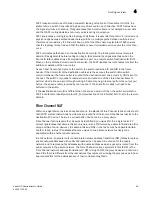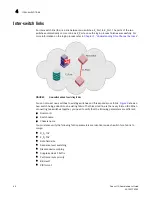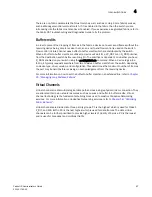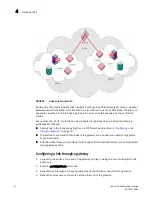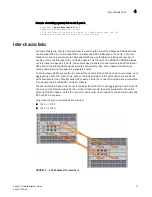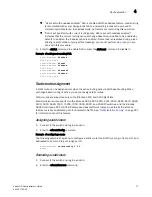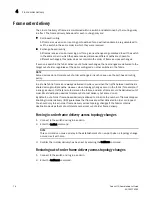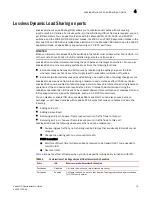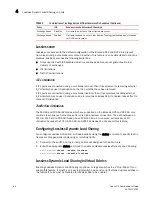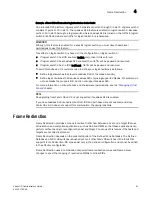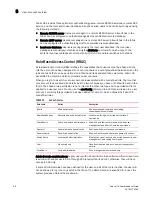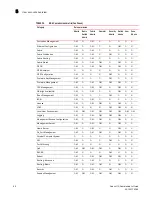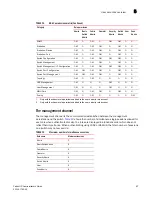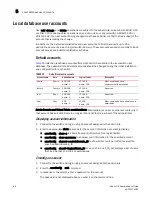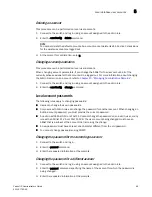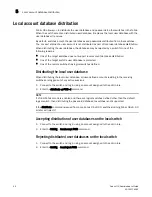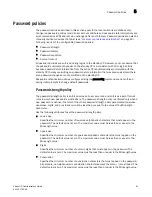
76
Fabric OS Administrator’s Guide
53-1001763-02
Route selection
4
Setting the routing policy
1. Connect to the switch and log in as admin.
2. Enter the switchDisable command to disable the switch.
3. Take the appropriate following action based on the route policy you choose to implement:
•
If Exchange-based policy is required, enter the aptPolicy 3 command.
•
If Port-based policy is required, enter the aptPolicy 1 command.
Setting up the AP route policy
1. Connect to the switch and log in as admin.
2. Enter the switchDisable command to disable the switch.
3. Take the appropriate following action based on the route policy you choose to implement:
•
If AP Shared Link policy (default) is required, enter the aptPolicy -ap 0 command.
•
If AP Dedicated Link policy is required, enter the aptPolicy -ap 1 command.
Route selection
Selection of specific routes can be dynamic, so that the router can constantly adjust to changing
network conditions; or it may be static, so that data packets always follow a predetermined path.
Dynamic Load Sharing
The exchange-based routing policy depends on the Fabric OS Dynamic Load Sharing feature (DLS)
for dynamic routing path selection. When using the exchange-based routing policy, DLS is enabled
by default and cannot be disabled. In other words, you cannot enable or disable DLS when the
exchange-based routing policy is in effect.
When the port-based policy is in force, you can enable DLS to optimize routing. When DLS is
enabled, it shares traffic among multiple equivalent paths between switches. DLS recomputes load
sharing when any of the following occurs:
•
a switch boots up
•
an E_Port goes offline and online
•
an EX_Port goes offline
•
a device goes offline
Setting DLS
1. Connect to the switch and log in as admin.
2. Enter the dlsShow command to view the current DLS setting.
One of the following messages appears:
•
“DLS is set” indicates that dynamic load sharing is turned on.
•
“DLS is not set” indicates that dynamic load sharing is turned off.
Summary of Contents for 53-1001763-02
Page 1: ...53 1001763 02 13 September 2010 Fabric OS Administrator s Guide Supporting Fabric OS v6 4 0 ...
Page 4: ...iv Fabric OS Administrator s Guide 53 1001763 02 ...
Page 24: ...xxiv Fabric OS Administrator s Guide 53 1001763 02 ...
Page 28: ...xxviii Fabric OS Administrator s Guide 53 1001763 02 ...
Page 32: ...xxxii Fabric OS Administrator s Guide 53 1001763 02 ...
Page 40: ...xl Fabric OS Administrator s Guide 53 1001763 02 ...
Page 42: ...2 Fabric OS Administrator s Guide 53 1001763 02 ...
Page 54: ...14 Fabric OS Administrator s Guide 53 1001763 02 High availability of daemon processes 1 ...
Page 74: ...34 Fabric OS Administrator s Guide 53 1001763 02 Basic connections 2 ...
Page 102: ...62 Fabric OS Administrator s Guide 53 1001763 02 Audit log configuration 3 ...
Page 214: ...174 Fabric OS Administrator s Guide 53 1001763 02 Management interface security 7 ...
Page 228: ...188 Fabric OS Administrator s Guide 53 1001763 02 Brocade configuration form 8 ...
Page 276: ...236 Fabric OS Administrator s Guide 53 1001763 02 Creating a logical fabric using XISLs 10 ...
Page 404: ...364 Fabric OS Administrator s Guide 53 1001763 02 ...
Page 440: ...400 Fabric OS Administrator s Guide 53 1001763 02 Performance data collection 17 ...
Page 480: ...440 Fabric OS Administrator s Guide 53 1001763 02 F_Port masterless trunking 19 ...
Page 494: ...454 Fabric OS Administrator s Guide 53 1001763 02 Buffer credit recovery 20 ...
Page 574: ...534 Fabric OS Administrator s Guide 53 1001763 02 Hexadecimal overview E ...




